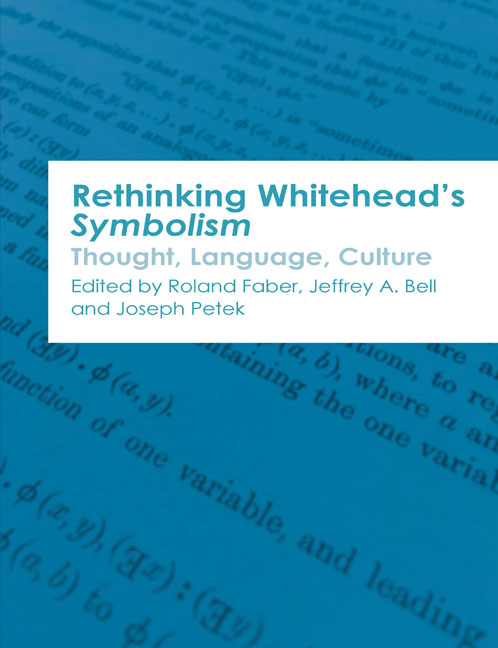Book contents
- Frontmatter
- Contents
- Abbreviations
- Introduction
- Part I Perception and Paradox
- 1 Whitehead on Causality and Perception
- 2 Originary Symbolism: Whitehead, Deleuze and the Process View on Perception
- 3 Uniting Earth to the Blue of Heaven Above: Strange Attractors in Whitehead's Symbolism
- Part II Adventures in Culture and Value
- Part III Misplaced Concreteness in Ethics and Science
- Notes on Contributors
- Index
2 - Originary Symbolism: Whitehead, Deleuze and the Process View on Perception
from Part I - Perception and Paradox
Published online by Cambridge University Press: 23 June 2018
- Frontmatter
- Contents
- Abbreviations
- Introduction
- Part I Perception and Paradox
- 1 Whitehead on Causality and Perception
- 2 Originary Symbolism: Whitehead, Deleuze and the Process View on Perception
- 3 Uniting Earth to the Blue of Heaven Above: Strange Attractors in Whitehead's Symbolism
- Part II Adventures in Culture and Value
- Part III Misplaced Concreteness in Ethics and Science
- Notes on Contributors
- Index
Summary
Introduction
Perhaps the problem that drives Whitehead's philosophy of nature and his metaphysics is the relation between internal and external standpoints, in particular the relation between the subjective viewpoint ‘here’ and the objective ‘view from nowhere’ – what Whitehead famously called ‘the bifurcation of nature’. All of Whitehead's metaphysical concepts are constructed with this problem in mind, and his theories of symbolism and perception are no exception. In fact, by tracing out Whitehead's understanding of perception, we follow one route through the problem of bifurcation.
As is well known, Whitehead responds to bifurcation in his later works with his ‘one genus’ theory of ‘dipolar’ actual occasions designed to circumvent or escape the difficulties associated with the various dualisms and materialisms of the tradition. Rather than ‘panpsychism’, which Whitehead never fully subscribed to (at least if we define panpsychism as a generalisation of psyche, mind, or consciousness), Whitehead's theory ascribes a ‘physical pole’ to every occasion, as well as a more or less recessive ‘mental pole’. Thus experience or perception (and, as we will see, Whitehead will generalise and equate them) is a contrast – an integration and synthesis – of physical inheritance and a more or less conceptual reaction. Conceptual appetition here should not be identified with consciousness. For Whitehead, consciousness presupposes experience. Consciousness is contingent and derivative, an evolutionarily later form of integration. Moreover, as a fully fledged ‘process theory’, the Whiteheadian occasion does not just passively ‘have’ or ‘undergo’ experience, is not just a static perceptual experience ‘of’ the real in the manner of a substance qualified by predicates, but is itself experience, an active experience of passage and becoming between interrelated processes that ‘influence each other, require each other and lead on to each other’ (MT 157). The world is in the occasion and the occasion is in the world. This is Whitehead's Leibnizian-inspired doctrine of ‘mutual immanence’ (MT 157), the creative ‘reciprocal insistence’ (PNK 14), as he says, between the occasion and the rest of nature.
Whitehead's accounts of perception are among his most important philosophical legacies because they challenge the bifurcation of nature and attempt to show the connectedness of occasions.
- Type
- Chapter
- Information
- Rethinking Whitehead’s SymbolismThought, Language, Culture, pp. 29 - 55Publisher: Edinburgh University PressPrint publication year: 2017

